People say that the bond between twins is special. There is anecdotal evidence of twins being able to read each other’s minds, experiencing the same physical sensations, and being able to finish each other’s sentences. So it’s understandable if the twins (or one of them) lean into the myths and want a close relationship with their sibling.
But where’s the line in this quest of having intertwined lives? Does that mean the partners of the twins should tolerate their requests even when they don’t feel comfortable? Take a wedding, for example. The bride and groom should make the decisions, not the groom’s twin, right? So, when one brother-in-law started making bizarre demands about his twin’s wedding, the bride went on to the Internet to check with people if her response to his behavior was appropriate.
A wedding is a special day for the bride and groom, and they should have the day that they want

Image credits: Wu Jianxiong / unsplash (not the actual photo)
Unfortunately, the twin brother of this groom started demanding some bizarre things, as he wanted his brother’s wedding to be more like his
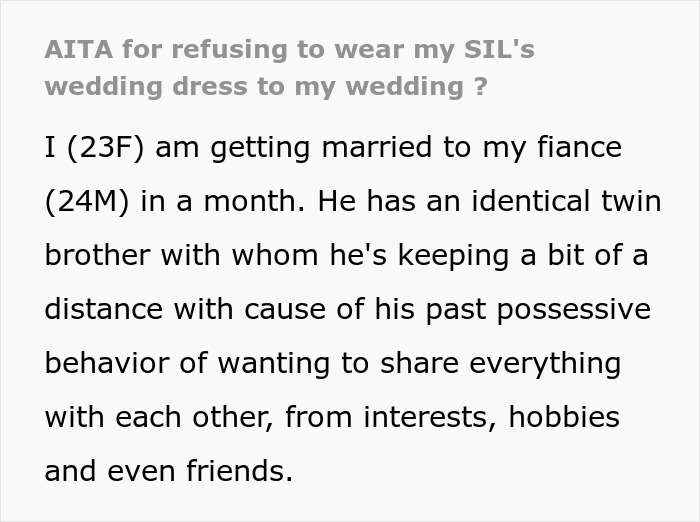

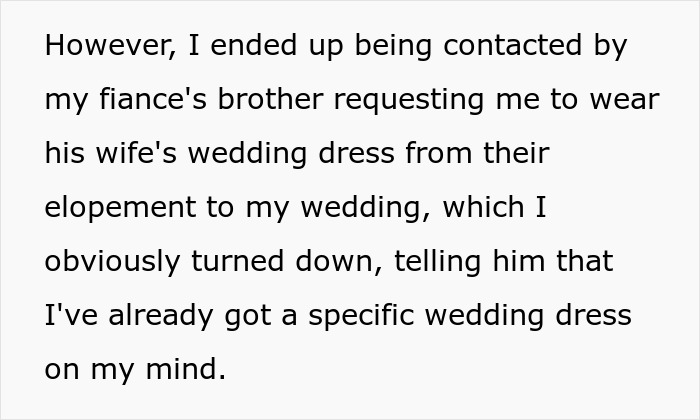

Image credits: Jonathan Borba / unsplash (not the actual photo)



Image credits: Zinkevych_D / envato (not the actual photo)
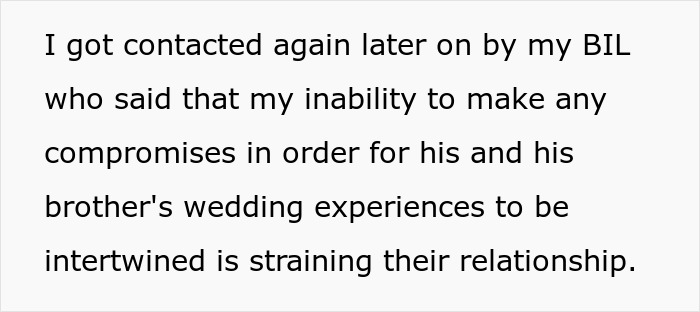


Image credits: Throw-awa-y109
The bride gave more info about her future husband’s family dynamic in the comments
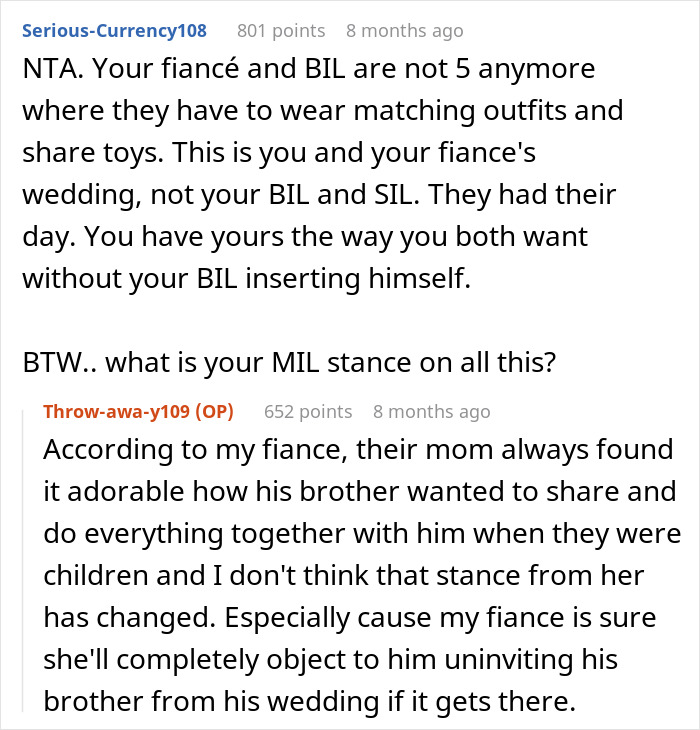


There is no scientific evidence that twins have a mysterious psychic connection
The bond between twins is usually significantly strong. And while some people attribute it to some mystical telepathic connection, we can explain it rationally. At least some of it. Researchers who have studied twins say there is no conclusive evidence yet to prove that twins share a telepathic connection.
Dr. Nancy L. Segal, a leading researcher in twins and the author of Twin Mythconceptions, says that many of the things some consider telepathy are just reflections of the loving and caring relationship between the siblings. Why do twins sometimes like and dislike the same things even if they weren’t raised together?
Segal explains this phenomenon with genetics: that’s what influences similarities in personality and interests. Dr. Marion Verp, a geneticist and obstetrician from Chicago, Illinois, claims that twins share much of the same DNA and have similar thinking patterns, so it’s no surprise that they might think alike.
Scientists have also debunked much of the anecdotal evidence surrounding twins. Like the myth that they can feel each other’s pain. There have been stories about twins sharing physical sensations, like the woman in Italy who claimed to feel abdominal pain just as her sister was giving birth elsewhere. Scientists explain that this phenomenon is due to a deep emotional connection and empathy.
Because many twins spend much of their lives together, they can anticipate how their sibling will react. Some of the phenomena mentioned above also happen between non-twins when individuals have an extremely strong emotional bond, thus debunking the otherworldly twin connection.
The twin bond is often stronger than any other familial bond

Image credits: Alena Darmel / pexel (not the actual photo)
Twins are often closer than any other family members. Twin expert Barbara Klein, Ph.D., Ed.D., writes that the twin bond is stronger than the connection between two siblings. It’s even stronger than the attachment between mother and child. She likens the bond to being “born married.”
Developing a separate identity can be hard for twins, and the antagonist brother in this story is a perfect example. Klein claims that, in some cases, twins might “over-identify with each other.” However, in this case, it seems that one brother felt the special twin bond meant that the two should even have their wedding together.
Klein writes that people shouldn’t romanticize or idolize twins. That only puts more pressure on both or one of them. It’s also normal for twins not to get along. Going back to the mystical twin connection, twins shouldn’t feel like they’re failing as siblings if they don’t feel a supernatural bond with their brother/sister.
The people in the twins’ lives shouldn’t lump them together as one entity. Establishing an identity is hard for the twins as it is, and failing to do so might lead to what licensed counselor Priscilla Dean, MA, calls “symbiotic disablement.”
As an identical twin herself, she refers to the instances when “I” becomes “we.” When the twins are children, it’s “we don’t like peas.” Then, when they grow up, it turns into “our wedding” instead of “my wedding.” This type of entanglement leads to “surrender of will and codependence” by one twin, Dean writes.
At the end of the day, it might be about twins carving their own identities and figuring out how to disentangle themselves from their twin, a thing that the future bride’s husband might be starting to do. “Twins sometimes are confused as to who they are in relationship to each other,” Barbara Klein writes. Perhaps the twin in this story might need some extra time to figure out who he is without his brother.
Many people were weirded out by the twin brother’s behavior and cautioned the bride to limit contact
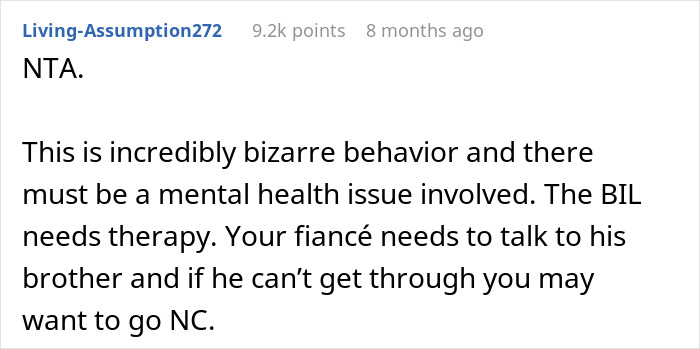




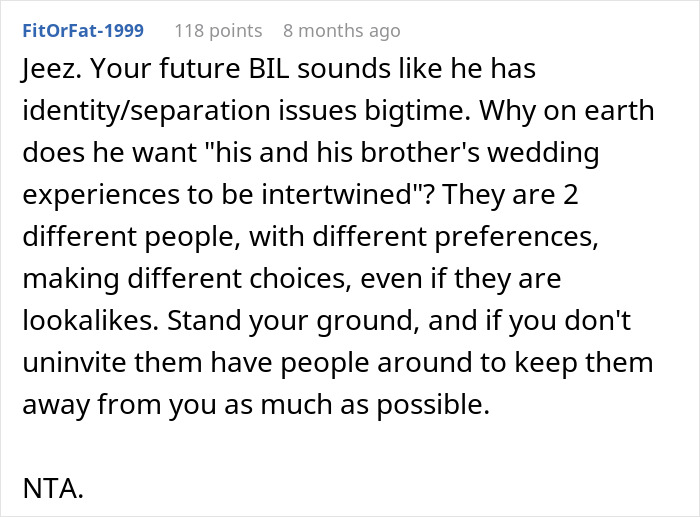
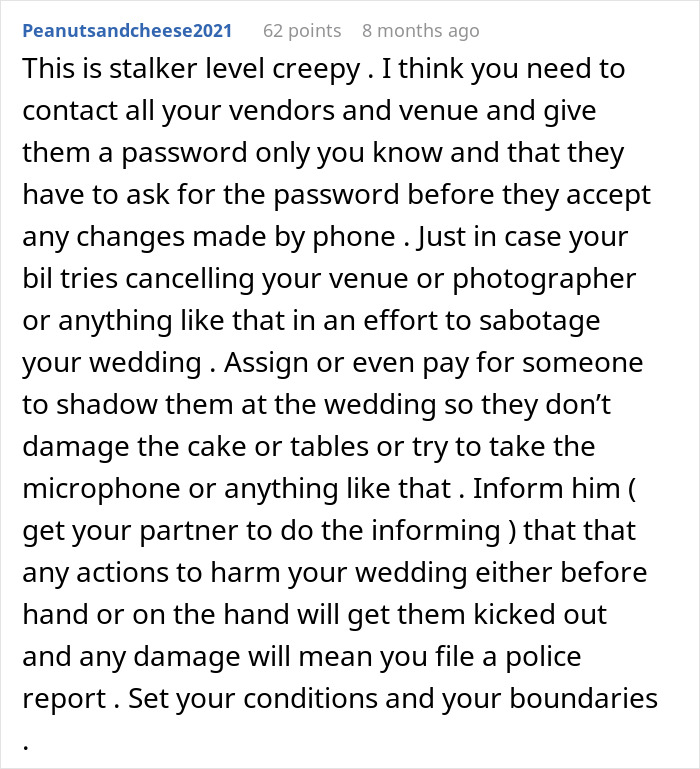



A couple of days later, the bride posted an update, and the disagreement escalated into a serious conflict


Image credits: Jonas Leupe / unsplash (not the actual photo)

After reading the update, people drew attention to the safety of the future newlyweds










